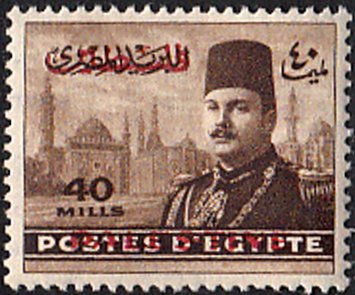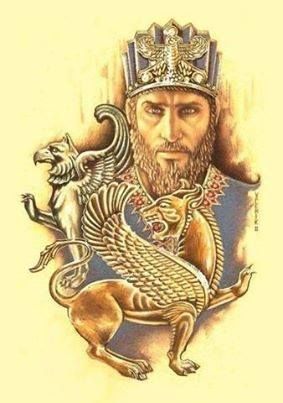Stamp: King Farouk & Sultan Hassan Mosque (Egypt 1948)
King Farouk & Sultan Hassan Mosque (Egypt 1948)
01 January (Egypt ) within release PALESTINIAN TERRITORIES (GAZA) goes into circulation Stamp King Farouk & Sultan Hassan Mosque face value 40 Egyptian millieme
| Stamp King Farouk & Sultan Hassan Mosque in catalogues | |
|---|---|
| Michel: | Mi:EG-PS 16 |
| Stamp Number: | Sn:EG N16 |
Stamp is square format.
Also in the issue PALESTINIAN TERRITORIES (GAZA):
- Stamp - E4 Overprinted face value 40;
- Stamp - King Farouk (1920-1965) face value 1;
- Stamp - King Farouk (1920-1965) face value 2;
- Stamp - King Farouk face value 4;
- Stamp - King Farouk face value 5;
- Stamp - King Farouk face value 10;
- Stamp - King Farouk face value 15;
- Stamp - King Farouk face value 17;
- Stamp - King Farouk face value 20;
- Stamp - King Farouk face value 22;
- Stamp - King Farouk face value 50;
- Stamp - King Farouk face value 1;
- Stamp - King Farouk & Pyramids of Gizeh face value 30;
- Stamp - King Farouk & Sultan Hassan Mosque face value 40;
- Stamp - King Farouk & Citadel of Cairo face value 50;
- Stamp - King Farouk & Assuan dam face value 100;
- Stamp - King Farouk & University of Cairo face value 200;
Stamp King Farouk & Sultan Hassan Mosque it reflects the thematic directions:
King is the title given to a male monarch in a variety of contexts. The female equivalent is queen regnant (while the title of queen on its own usually refers to the consort of a king). In the context of prehistory, antiquity and contemporary indigenous peoples, the title may refer to tribal kingship. Germanic kingship is cognate with Indo-European traditions of tribal rulership (c.f. Indic rājan, Gothic reiks, and Old Irish rí, etc.) In the context of classical antiquity, king may translate Latin rex or either Greek archon or basileus. In classical European feudalism, the title of king as the ruler of a kingdom is understood as the highest rank in the feudal order, potentially subject, at least nominally, only to an emperor (harking back to the client kings of the Roman Empire). In a modern context, the title may refer to the ruler of one of a number of modern monarchies (either absolute or constitutional). The title of king is used alongside other titles for monarchs, in the West prince, emperor, archduke, duke or grand duke, in the Middle East sultan or emir; etc. Kings, like other royalty, tend to wear purple because purple was an expensive color to wear in the past.
Mosquitoes, the Culicidae, are a family of small flies consisting of 3,600 species. The word mosquito (formed by mosca and diminutive -ito) is Spanish and Portuguese for little fly. Mosquitoes have a slender segmented body, one pair of wings, three pairs of long hair-like legs, and specialized, highly elongated, piercing-sucking mouthparts. All mosquitoes drink nectar from flowers; females of some species have in addition adapted to drink blood. The group diversified during the Cretaceous period. Evolutionary biologists view mosquitoes as micropredators, small animals that parasitise larger ones by drinking their blood without immediately killing them. Medical parasitologists view mosquitoes instead as vectors of disease, carrying protozoan parasites or bacterial or viral pathogens from one host to another.

